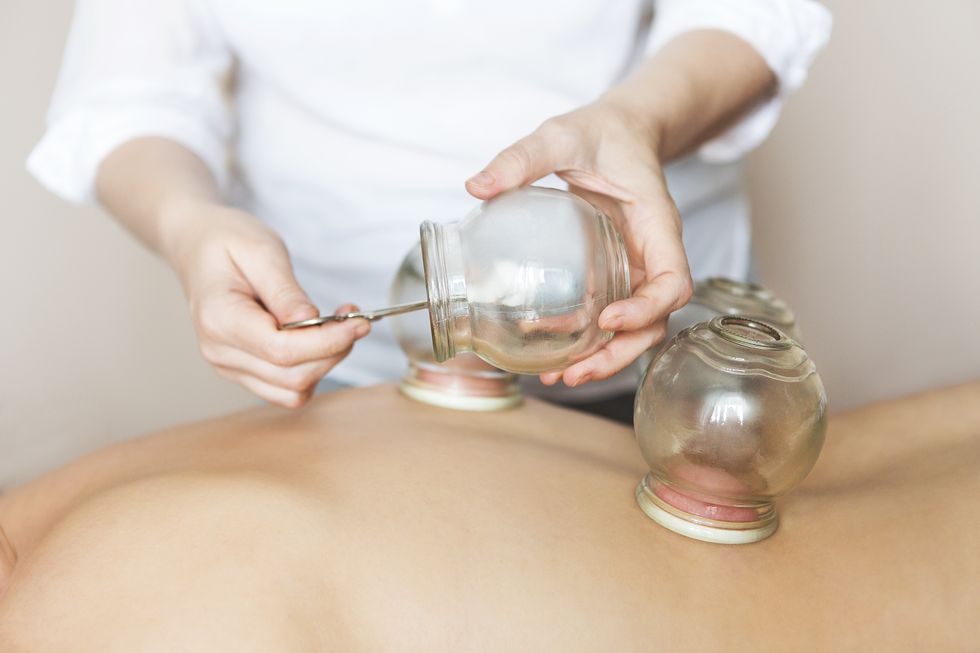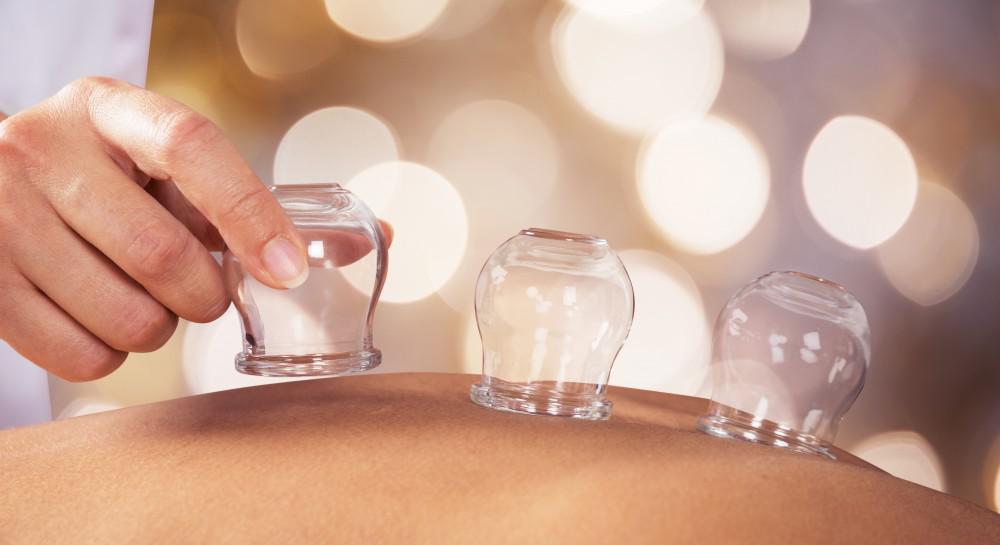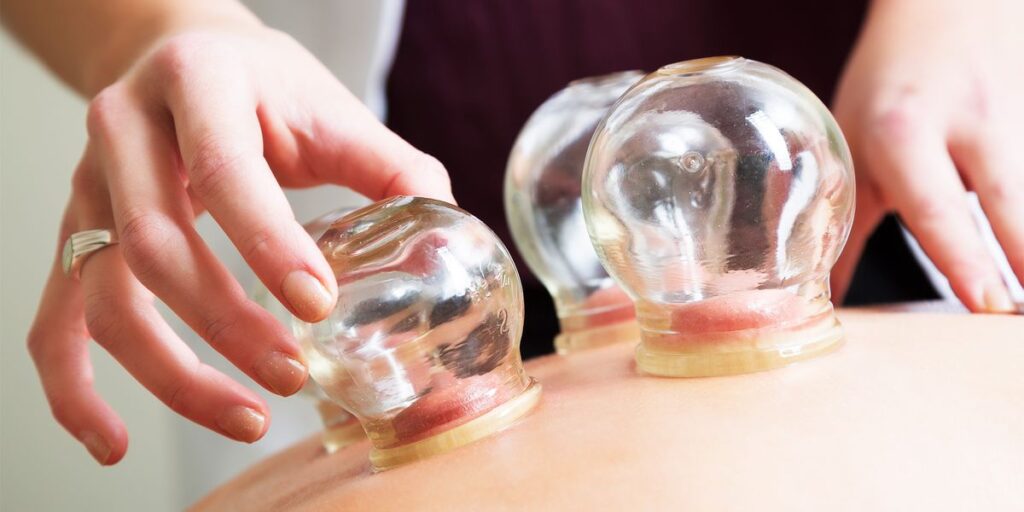
The Prophet’s guidance using honey, cupping and cauterizing as remedies.
AI-Bokhary narrated that the Prophet said:
“There is cure in three substances, a drink of honey, a slash with a knife used for cupping and cauterizing by fire. I forbid my Nation from cauterizing by fire. “
Abu ‘Abdullah AI-Maziri said, Plethoric (excessive substances) conditions are either sanguineous (bloody), bilious, phlegm, or melancholic. Curing sanguineous plethora entails extracting the blood.
If plethora was from the other three types, its cure is in softening the stool as warranted for each disease.
The Prophet Us has indicated that honey is used as a laxative and that cupping is used to extract [septic] blood.
Some people said that when the slash by a cupping knife does not work, the last resort is branding by fire (cauterizing).
The Prophet b mentioned branding by fire as a last resort when the body has a strong resistance against medicine, rendering it ineffective. The Prophet b then said: “I forbid my Ummah (Muslim Nation) from branding by fire (cauterizing),”
and in another narration, “I do not like to be branded by fire.” Cauterizing by fire should be the last resort and only used when warranted. The fire should not be the first choice because of the intense pain it causes and which will be used to remove a lesser pain!
Some doctors said that diseases related to the temperament are either material or non-material. The material types are either cold, hot, wet or dry or a combination of these conditions. The four conditions, hotness and coldness are effected, while the other two,
wetness and dryness, are usually affected. When one of the two effective temperaments is stronger than the other, one of the affected temperaments usually accompanies it. Every type of temperament in the body has two parts, effective and affected.
Temperamental ailments are usually caused by whichever effective condition is stronger, hotness or coldness. The Prophet’s statement directs us to the origin of ailments, hotness and coldness. If the ailment was hot, the cure entails extracting the blood by cupping or puncturing the veins, both of which help extract the septic matter, cooling the temperament. If the ailment is cold, we treat it with heat, such as by taking honey.
If we In addition need to extract the cold material that has caused the ailment, honey In addition helps in this case because it leads the various substances to maturity along with its other qualities of cleansing, softening, soothing and purging the affected organs. In this case, the septic material will be gently extracted while saving the body the annoyance of using strong laxatives.
Physical ailments are either acute, not needing cauterization because they would soon be neutralized, or chronic ailments, for which cauterizing the proper organ is the best remedy after extracting the septic substances. Chronic diseases usually result from thick, cold septic substances residing in the affected organ, ailing it spoiling its constitution and, thereby, inflaming the parts of the body that are directly connected to the affected organ. Therefore, cauterizing should be used to dissipate and extract the septic substances in the affected organ with fire.
The Hadith explains treatments for all type of physical ailments, just as we learned the treatment method for all simple ailments (accompanied by fever) from the Hadith,
“The heat of the fever is a breath of the Hell Fire; cool it with water.”

Cupping continued
As for cupping, Ibn Majah narrated in his Sunan that the Messenger of Allah b said:
“During the night of Israa’ (the overnight journey from Mecca to Jerusalem and then to the heavens), every company (of angels) that I passed by would say, ‘O Muhammad! Order your nation to use cupping.”’
In addition, in the Sahihan it is narrated that the Prophet ate once had his blood cupped (medically) and paid the person who applied the cupping.
Further, in tne Sahihan it is narrated:
Abu Taybah cupped Allah’s Messenger b who then ordered that Abu Taybah be paid one So (a measure pertaining to food) of dates and oidered his masteis to reduce his tax (as he was a slave and had to pay a tax to them). The Prophet a§ then said:
“Cupping is among your best remedies.”
The benefits of cupping include cleansing the exterior parts of the body more than puncturing the veins, or puncturing the veins, is better when used to extract blood from the internal parts of the body. Cupping entails removing blood from the various parts of the skin.
Using either cupping or puncturing the veins depends on the time of year, the area, the age and state of the ailing person. For instance, cupping is more beneficial than puncturing the veins in warm areas, warm weather and hot-tempered people, whose blood is near maturity (concerning the septic substances in the blood). In this case, the septic, maturing blood will collect near the skin.
Cupping extracts the septic blood more efficiently than puncturing the veins. This is why using cupping for children and those who cannot bear puncturing the veins is better and more useful.
Doctors affirm that cupping is better used in warm areas than puncturing the veins and that cupping is preferred in the middle of the month or soon after,
especially in the last quarter in the month. In the beginning of the month, the blood will have already become irritated (thus carrying septic materials that need to be cupped). In the end of the month, the blood will be idle, unlike the case in the middle and last quarter of the month when the blood is agitated and sufficiently produced.
The author of AI-Qanun said, ‘Cupping is not preferred in the beginning of the month, because the body’s various conditions will not be agitated then, nor is it preferred in the end of the month, because by then the conditions would have decreased. Cupping is preferred in the middle of the month when the substances (of the constitution, or condition) accumulate and become agitated.’ It was reported that the Prophet b said:
“Cupping and puncturing the veins are your best
remedies.”
This Hadith is directed at the people of Hijaz and warm areas in general, for their blood is delicate and circulates closer to the surface of the skin, while the pores on their skin are wide and their strength weakened (i.e., during summer). Puncturing the veins is harmful for them. Puncturing of each of the veins usually has a special benefit. For instance, puncturing of the basilica vein (the large vein running on the inner side of the upper arm) is useful against the neat of the liver and spleen and various
blood-related tumors in these two organs. It is In addition useful for tumors of the lungs (emphysema), arterial pulsation, pleurisy and all blood-related diseases of veins in the lower part of the knee to the hip.
Further, puncturing of the median vein helps against the various swellings that appear throughout the entire body, especially when the swelling is blood-related, and contains spoiled blood in general.
In addition, puncturing of the arm’s vein helps against the ailments in the head and neck that result from excessive amounts of blood or from septic blood. Puncturing of the jugular vein helps against the ailments of the spleen, asthma, thoracic cavity and forehead pain.
Cupping the upper section of the back helps against the aches of the shoulder and the throat. Further, cupping the two jugular veins helps against the ailments of the head, face, teeth, ears, eyes, nose and throat, if these ailments were caused by excessive presence of blood, soiled blood or both.
Anas said:
“The Messenger of Allah used to apply cupping on the two jugular veins and the upper part of the back.” [Abu Dawood, At-Termezey, Ibn Majah, Ahmad and AIHakim].
“The Messenger of Allah b used to apply cupping on three areas, his upper back area and the two jugular veins.” [AI-Bokhary and Moslem],
It is In addition narrated in the Sahih that the Prophet b used cupping on his head when he was in a state of Ihram (for Hajj or omrah) due to a headache.
In addition, Abu Dawood narrated that Jabir said that the Prophet s& used cupping on his hip because of a debilitation he suffered from.
Doctors have conflicting opinions regarding cupping on the nape cavity
Some doctors approved of this form of cupping, saying that it helps against exophthalmoses, the abnormal protrusion of the eyeballs, the heaviness in the eyebrows and the eyelids and against eyelid mange. A Hadith states:
“Use cupping on the nape cavity, for it cures seventy two kinds of ailments.”
Further, it was narrated that when Ahmad bin Hanbal needed cupping on the nape cavity, he did it on the two sides of the nape but not on the cavity itself.
The author of the Qonun In addition disliked cupping the cavity of the nape saying that, “It causes forgetfulness just as our Prophet Muhammad b has stated. This is because the back of the brain is the location of the memory power and cupping it affects that power.”
Other people did not approve of his opinion though, saying that the Hadith that he referred to is not authentic. They said that even if the Hadith is authentic, cupping weakens the brain if cupping occurs without a necessity that warrants it.
When warranted, cupping the nape cavity is medically and religiously useful against the pressure of the blood on the cavity. Authentic narrations have stated that the Prophet A used cupping in many areas on the back of his neck and in other areas of his body as much as was needed.
Cupping under the chin helps against toothache, face ailments and throat infections when used at the proper time Cupping under the chin In addition cleanses and purifies the head and the jaws. Further, cupping on top of the foot substitutes for the puncturing of the saphena, which is a vein on the heel.
This kind of cupping In addition helps against the ulcers that occur on the thighs and legs, the interruption of monthly periods and skin irritation on the testicles.
Cupping on the lower part of the chest helps against spots, sores and mange on the thigh. It In addition helps against gout, hemorrhoids, elephantiasis and itchiness on the back

When is cupping preferred
Anas related from the Prophet b that he said:
“The Messenger of Allah b used to have cupping on the jugular veins and the upper part of the back on the seventeenth, nineteenth or twenty-first (day of the month).” (At-Termezey)
Anas related from the Prophet b that he said:
“Those who intend to have cupping let them do that on the seventeenth, nineteenth or twenty-first (of the month), to prevent the septic blood from causing death to one of you.” (Ibn Majah)
In addition, Abu Dawood narrated that Abu Hurayrah related from the Prophet b that he said:
“Those who have cupping on the seventeenth, nineteenth or twenty-first will be cured from every
disease.”
“Every disease” mentioned in the Hadith means the blood-related” diseases. [Both of the last two Ahadeeth are weak] .
These Ahadeeth conform to the position taken by doctors that cupping is preferred in the latter half of the month and the third quarter, rather than the beginning or the end of the month. However, if cupping is necessary, it will be useful during any part of the month including the beginning and the end. It was reported that Imam Ahmad Ibn Hanbal used to practice cupping during any part of the month when the spoiled blood became agitated.
The author of AI-Qanun said, “Cupping is preferred during the day, the second or the third hour and after one takes a bath. When warranted, one should take a bath then rest for an hour or so and then use cupping.” Cupping is not preferred when the stomach is full, for it might cause various ailments, especially after taking a heavy meal.
It was said that cupping on an empty stomach is a cure, and when one’s stomach is full is a disease, and when it is done on the seventeenth [of the month] it becomes a remedy. Choosing the best time for cupping preserves good health and helps prevent harm from occurring to the body. However, when the illness intensifies, cupping becomes warranted and needed whatever the circumstances, for the Prophet b said:
“So that the septic blood does not cause death to one of you.”
We stated before that Imam Ahmad used to use cupping during any time of the month if cupping was medically warranted.
As for the best days of the week to have cupping, AI-Khallal said that Imam Ahmad was asked about the days when cupping is not preferred, and he said, “Wednesday and Saturday.
” In addition AI-Khallal narrated that Imam Ahmad was once asked about the days when cupping is disliked and Imam Ahmad answered, “Saturday and Wednesday, and In addition Friday as was reported.” [However, all the Ahadeeth that state the time when the cupping is either preferred or disliked are weak, according to the scholars of Hadith],
The previous Ahadeeth we mentioned state that seeking the cure, including cupping, is preferred. In addition, cupping is done in the part of the body that most needs it. In addition, those who have assumed ihram are allowed to use cupping, even if it involves cutting some hair and they do not have to pay a penalty.
Further, it is allowed for those who are fasting to use cupping as AIBokhary narrated that the Messenger of Allah b used cupping while he was fasting.
There are several Ahadeeth that state that cupping breaks the Fast. The only Hadith that appears to contradict this ruling is the Hadith that the Prophet A had cupping while fasting. In this case, for the Hadith to mean that cupping does not break the Fast, it should satisfy one of the following four conditions.
First, Fasting should have been obligated by the time., the incident in the Hadith [narrated by AI-Kukhah above] occurred. Second, it should be proven that the Prophet b was not traveling [when he had cupping].
Third, that the Prophet b was not suffering from an illness that warranted cupping. Fourth, that this Hadith came after the Prophet said, “Those having cupping and those who do it have both broken their Fast.
” If these tour conditions are satisfied, only then can we say that cupping does not break the fast relying on the Hadith [that the Prophet b had cupping when he was fasting]. Otherwise, the Fast mentioned in the Hadith might have been a voluntary fast that one is allowed to break when cupping is warranted. Or it could have occurred during Ramadan but while the Prophet a& was traveling.
Or, the Hadith could be talking about a compulsory Fast during Ramadan but that it was necessary to have cupping due to an illness.
Or, cupping could have been done during Ramadan and without a necessity that warrants it, but before the Prophet b issued his statement that cupping breaks the Fast of those involved in it.
There is no proof that any of the four conditions we mentioned above were satisfied, so how about all four of them? [That is why Ibn Al-Qayyun asserts that cupping breaks the Fast of those who are doing it and those who are having it done].
In addition, the Hadith proves that one is allowed to hire a doctor for a certain purpose and then pay him for his services without a service contract.
The Hadith [that the Prophet b paid the person who performed cupping for him] In addition indicates that some people are allowed to make cupping their profession. The Prophet b gave the man who performed cupping some money and that person spent that money on his necessities. Furthermore, cupping is similar to garlic and onion in that they are described as being impure. But we are still allowed to use them.
Finally, the Hadith proves that one is allowed to collect reasonable taxes from his slave and that the slave is allowed to use whatever is left after paying the tax. Otherwise, if the master is going to take all the money anyway, it will not be called a tax any more! Therefore, whatever is left with the slave beyond the required tax is his property and he can do whatever he wishes with it.
For Prophets Stories Visit Https://Sunofislam.Com/Prophetsofgod/
For Scientific Miracles Articles Visit Www.Sunofislam.Com
